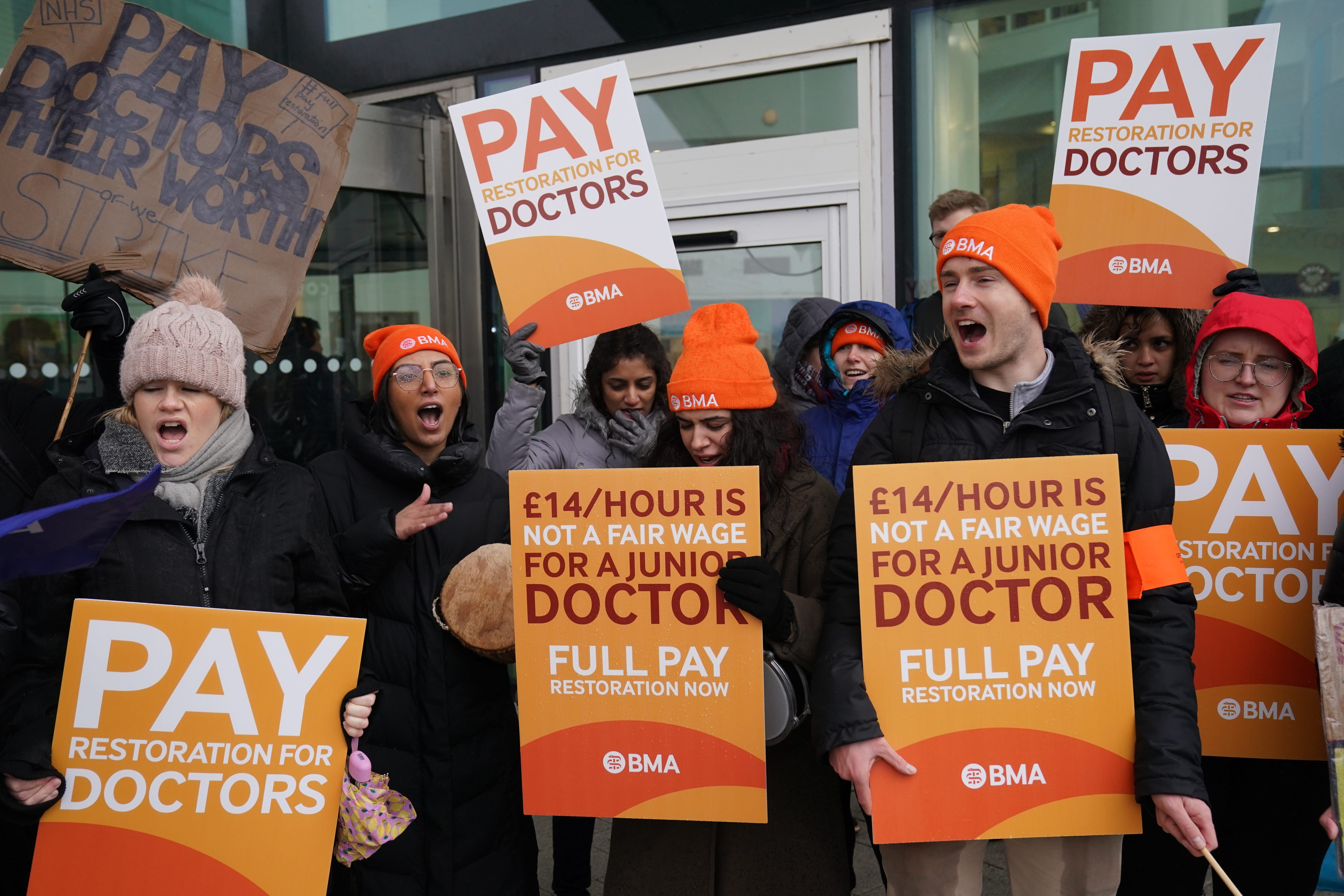Emergency care to be prioritised during junior doctors’ strike, says NHS England
England’s top doctor has warned that the walkouts are set to be ‘the most disruptive industrial action in NHS history’.

Your support helps us to tell the story
From reproductive rights to climate change to Big Tech, The Independent is on the ground when the story is developing. Whether it's investigating the financials of Elon Musk's pro-Trump PAC or producing our latest documentary, 'The A Word', which shines a light on the American women fighting for reproductive rights, we know how important it is to parse out the facts from the messaging.
At such a critical moment in US history, we need reporters on the ground. Your donation allows us to keep sending journalists to speak to both sides of the story.
The Independent is trusted by Americans across the entire political spectrum. And unlike many other quality news outlets, we choose not to lock Americans out of our reporting and analysis with paywalls. We believe quality journalism should be available to everyone, paid for by those who can afford it.
Your support makes all the difference.NHS staff will prioritise emergency and urgent care during the junior doctors’ strike which is set to be “the most disruptive industrial action in NHS history”, NHS England has announced.
National medical director of NHS England Professor Sir Stephen Powis warned four days of walkouts by junior doctors, in the bitter dispute over pay, will bring “immense pressures” on staff and services.
The strikes will come immediately after the Easter bank holiday weekend and will run from 7am on Tuesday until the morning of Saturday April 15.
In a statement, NHS England announced that staff will be asked to prioritise emergency and urgent care over some routine appointments and procedures to ensure safe care for those in life-threatening situations.
The health body added that appointments and operations will only be cancelled “where unavoidable” and patients will be offered alternative dates as soon as possible.
Professor Sir Stephen said: “The NHS has been preparing extensively for the next set of strikes but managing additional pressure doesn’t get easier as time goes by – it gets much more difficult, not only due to the sheer number of appointments that need to be rescheduled, but also that they can take time to rearrange with multiple teams involved.
“This is set to be the most disruptive industrial action in NHS history, and the strikes tomorrow will bring immense pressures, coming on the back of a challenged extended bank holiday weekend for staff and services.
“Emergency, urgent and critical care will be prioritised but some patients will unfortunately have had their appointments postponed – if you haven’t, please do continue to come forward.”
This demand is widely out of step with pay settlements in other parts of the public sector at a time of considerable economic pressure on our country
Up to a quarter of a million appointments and operations could be postponed, according to the NHS Confederation.
In an op-ed for the Sunday Telegraph, Health Secretary Steve Barclay said the decision from BMA leaders to maintain an “unrealistic position” for a 35% pay increase demand has halted any progress with talks between the two parties.
“This demand is widely out of step with pay settlements in other parts of the public sector at a time of considerable economic pressure on our country. A salary hike of this size would see some junior doctors receiving more than an extra £20,000 a year,” he said.
“I recognise their hard work and dedication. But it is deeply disappointing that this industrial action has been timed by the British Medical Association (BMA) Junior Doctors Committee to cause maximum disruption to both patients and other NHS staff.”
Mr Barclay said he remains “determined” to find a fair offer that benefits junior doctors, but also halves inflation.
Dr Mike Greenhalgh, deputy co-chair of the BMA’s Junior Doctors Committee, told BBC One’s Breakfast show on Sunday: “It’s hard to negotiate when only one side is doing it and we’re not getting anything back from the Government on that front.”
He added: “We’re happy to meet at any time. We would still meet him over the bank holiday weekend before the industrial action next week.
“And if he was to bring a credible offer to us, it could still, even at this late stage, avert action.”
Junior doctors make up around half of all doctors in the NHS according to NHS England.
They are qualified doctors who have up to eight years’ experience working as a hospital doctor, depending on their speciality, or up to three years in general practice.
The health service said people must still access the care they need in the usual way, only using 999 and A&E in life-threatening emergencies and using NHS 111 online and other services for non-urgent health needs.